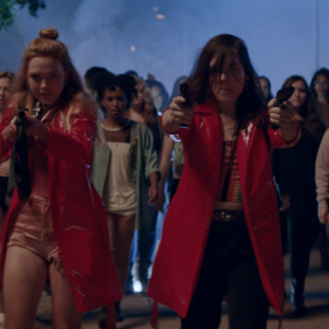By: Jolie Featherstone
With the stately air and solid bones of a 1940s crime drama, The Last Vermeer is a respectable debut feature film from Dan Friedkin, a former stunt pilot and producer.
Set in Amsterdam shortly after WWII, The Last Vermeer is based on a captivating true story. A Jewish soldier and member of the resistance, Joseph Piller (Claes Bang of The Burnt Orange Heresy), investigates renowned Dutch artist and bon vivant, Han van Meegeren (Guy Pearce) – who appears to be renowned more for his lavish lifestyle and wild parties than his artistic career (or so the critics would have everyone believe). Han van Meegeren stands accused of conspiring with the Nazis. Indeed, he’s accused of selling a sublime Vermeer, one of the most beloved Dutch Masters, to Hermann Göring, widely considered to be one of the most notorious members of the Nazi party, for an astounding price. Despite mounting evidence and suspicion, Piller suspects that there may be more than meets the eye behind this transaction. Polar opposites, Piller and van Meegeren engage in a knowing back-and-forth on morality throughout the investigation. Piller is assisted by his friend and confidante, Esper Dekker (Roland Møller) and assistant, Minna Holmberg (Vicky Krieps). Together, they work to uncover the truth, all while racing against the clock to defend van Meegeren from the forces calling for his punishment.
Outside of its subject matter, The Last Vermeer is reminiscent of a bygone era in atmosphere and design. Indeed, it feels akin to classic studio films made in the years following the film’s events. It’s the kind of film that would attract a more mature, sophisticated audience. Lead actor Claes Bang brings a classic leading man sensibility to the screen. As Piller, he calls to mind the stoic Gregory Peck. Similarly, Roland Møller’s Dekker is likable and rugged – a classic Hollywood bruiser with an unflinching loyalty to his friend. The consistently excellent Pearce revels in the role as the Dionysian and mischievous van Meegeren. Although this performance could have easily become outlandish, with the deft hand of a seasoned pro, Pearce keeps the character from going over that line. Watching him slink and swagger through the film, it’s a pleasure to watch Pearce relish in the performance.
Handsome and dependable, The Last Vermeer dips into the ethical and moral questions plaguing those that lived through the occupation and war – yet stops short of diving in unrestrained. Although the waters are deep, the film plays it safe. I would have been interested to further explore each characters’ inner-workings post-war, especially Piller’s.
Friedkin gives this entirely engrossing, truth-is-stranger-than-fiction story a classic cinematic adaptation that harkens to the stately dramas of yesteryear. While the film does broach intense topics, it remains tasteful and respectful in its handling. Indeed, such storytelling feels like a bit of a breath of fresh air from the “box office bait” that tends to dominate the charts.
**********
Do You Tweet? Follow These Tweeple:
Jolie Featherstone: @TOFilmFiles





Be the first to comment